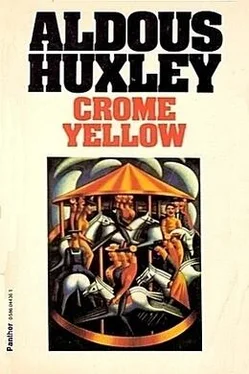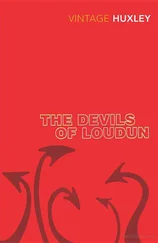In Sir Ferdinando's time, he reflected, in the time of his son, Sir Julius, these young men would have had their Sunday diversions even at Crome, remote and rustic Crome. There would have been archery, skittles, dancing—social amusements in which they would have partaken as members of a conscious community. Now they had nothing, nothing except Mr. Bodiham's forbidding Boys' Club and the rare dances and concerts organised by himself. Boredom or the urban pleasures of the county metropolis were the alternatives that presented themselves to these poor youths. Country pleasures were no more; they had been stamped out by the Puritans.
In Manningham's Diary for 1600 there was a queer passage, he remembered, a very queer passage. Certain magistrates in Berkshire, Puritan magistrates, had had wind of a scandal. One moonlit summer night they had ridden out with their posse and there, among the hills, they had come upon a company of men and women, dancing, stark naked, among the sheepcotes. The magistrates and their men had ridden their horses into the crowd. How self–conscious the poor people must suddenly have felt, how helpless without their clothes against armed and booted horsemen! The dancers were arrested, whipped, gaoled, set in the stocks; the moonlight dance is never danced again. What old, earthy, Panic rite came to extinction here? he wondered. Who knows?—perhaps their ancestors had danced like this in the moonlight ages before Adam and Eve were so much as thought of. He liked to think so. And now it was no more. These weary young men, if they wanted to dance, would have to bicycle six miles to the town. The country was desolate, without life of its own, without indigenous pleasures. The pious magistrates had snuffed out for ever a little happy flame that had burned from the beginning of time.
"And as on Tullia's tomb one lamp burned clear, Unchanged for fifteen hundred year…"
He repeated the lines to himself, and was desolated to think of all the murdered past.
Henry Wimbush's long cigar burned aromatically. The "History of Crome" lay on his knee; slowly he turned over the pages.
"I can't decide what episode to read you to–night," he said thoughtfully. "Sir Ferdinando's voyages are not without interest. Then, of course, there's his son, Sir Julius. It was he who suffered from the delusion that his perspiration engendered flies; it drove him finally to suicide. Or there's Sir Cyprian." He turned the pages more rapidly. "Or Sir Henry. Or Sir George…No, I'm inclined to think I won't read about any of these."
"But you must read something," insisted Mr. Scogan, taking his pipe out of his mouth.
"I think I shall read about my grandfather," said Henry Wimbush, "and the events that led up to his marriage with the eldest daughter of the last Sir Ferdinando."
"Good," said Mr. Scogan. "We are listening."
"Before I begin reading," said Henry Wimbush, looking up from the book and taking off the pince–nez which he had just fitted to his nose—"before their begin, I must say a few preliminary words about Sir Ferdinando, the last of the Lapiths. At the death of the virtuous and unfortunate Sir Hercules, Ferdinando found himself in possession of the family fortune, not a little increased by his father's temperance and thrift; he applied himself forthwith to the task of spending it, which he did in an ample and jovial fashion. By the time he was forty he had eaten and, above all, drunk and loved away about half his capital, and would infallibly have soon got rid of the rest in the same manner, if he had not had the good fortune to become so madly enamoured of the Rector's daughter as to make a proposal of marriage. The young lady accepted him, and in less than a year had become the absolute mistress of Crome and her husband. An extraordinary reformation made itself apparent in Sir Ferdinando's character. He grew regular and economical in his habits; he even became temperate, rarely drinking more than a bottle and a half of port at a sitting. The waning fortune of the Lapiths began once more to wax, and that in despite of the hard times (for Sir Ferdinando married in 1809 in the height of the Napoleonic Wars). A prosperous and dignified old age, cheered by the spectacle of his children's growth and happiness—for Lady Lapith had already borne him three daughters, and there seemed no good reason why she should not bear many more of them, and sons as well—a patriarchal decline into the family vault, seemed now to be Sir Ferdinando's enviable destiny. But Providence willed otherwise. To Napoleon, cause already of such infinite mischief, was due, though perhaps indirectly, the untimely and violent death which put a period to this reformed existence.
"Sir Ferdinando, who was above all things a patriot, had adopted, from the earliest days of the conflict with the French, his own peculiar method of celebrating our victories. When the happy news reached London, it was his custom to purchase immediately a large store of liquor and, taking a place on whichever of the outgoing coaches he happened to light on first, to drive through the country proclaiming the good news to all he met on the road and dispensing it, along with the liquor, at every stopping–place to all who cared to listen or drink. Thus, after the Nile, he had driven as far as Edinburgh; and later, when the coaches, wreathed with laurel for triumph, with cypress for mourning, were setting out with the news of Nelson's victory and death, he sat through all a chilly October night on the box of the Norwich 'Meteor' with a nautical keg of rum on his knees and two cases of old brandy under the seat. This genial custom was one of the many habits which he abandoned on his marriage. The victories in the Peninsula, the retreat from Moscow, Leipzig, and the abdication of the tyrant all went uncelebrated. It so happened, however, that in the summer of 1815 Sir Ferdinando was staying for a few weeks in the capital. There had been a succession of anxious, doubtful days; then came the glorious news of Waterloo. It was too much for Sir Ferdinando; his joyous youth awoke again within him. He hurried to his wine merchant and bought a dozen bottles of 1760 brandy. The Bath coach was on the point of starting; he bribed his way on to the box and, seated in glory beside the driver, proclaimed aloud the downfall of the Corsican bandit and passed about the warm liquid joy. They clattered through Uxbridge, Slough, Maidenhead. Sleeping Reading was awakened by the great news. At Didcot one of the ostlers was so much overcome by patriotic emotions and the 1760 brandy that he found it impossible to do up the buckles of the harness. The night began to grow chilly, and Sir Ferdinando found that it was not enough to take a nip at every stage: to keep up his vital warmth he was compelled to drink between the stages as well. They were approaching Swindon. The coach was travelling at a dizzy speed—six miles in the last half–hour—when, without having manifested the slightest premonitory symptom of unsteadiness, Sir Ferdinando suddenly toppled sideways off his seat and fell, head foremost, into the road. An unpleasant jolt awakened the slumbering passengers. The coach was brought to a standstill; the guard ran back with a light. He found Sir Ferdinando still alive, but unconscious; blood was oozing from his mouth. The back wheels of the coach had passed over his body, breaking most of his ribs and both arms. His skull was fractured in two places. They picked him up, but he was dead before they reached the next stage. So perished Sir Ferdinando, a victim to his own patriotism. Lady Lapith did not marry again, but determined to devote the rest of her life to the well–being of her three children—Georgiana, now five years old, and Emmeline and Caroline, twins of two."
Henry Wimbush paused, and once more put on his pince–nez. "So much by way of introduction," he said. "Now I can begin to read about my grandfather."
Читать дальше











